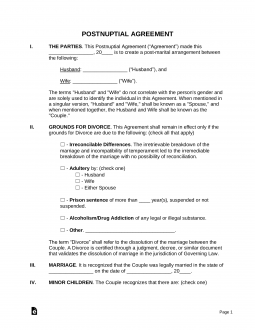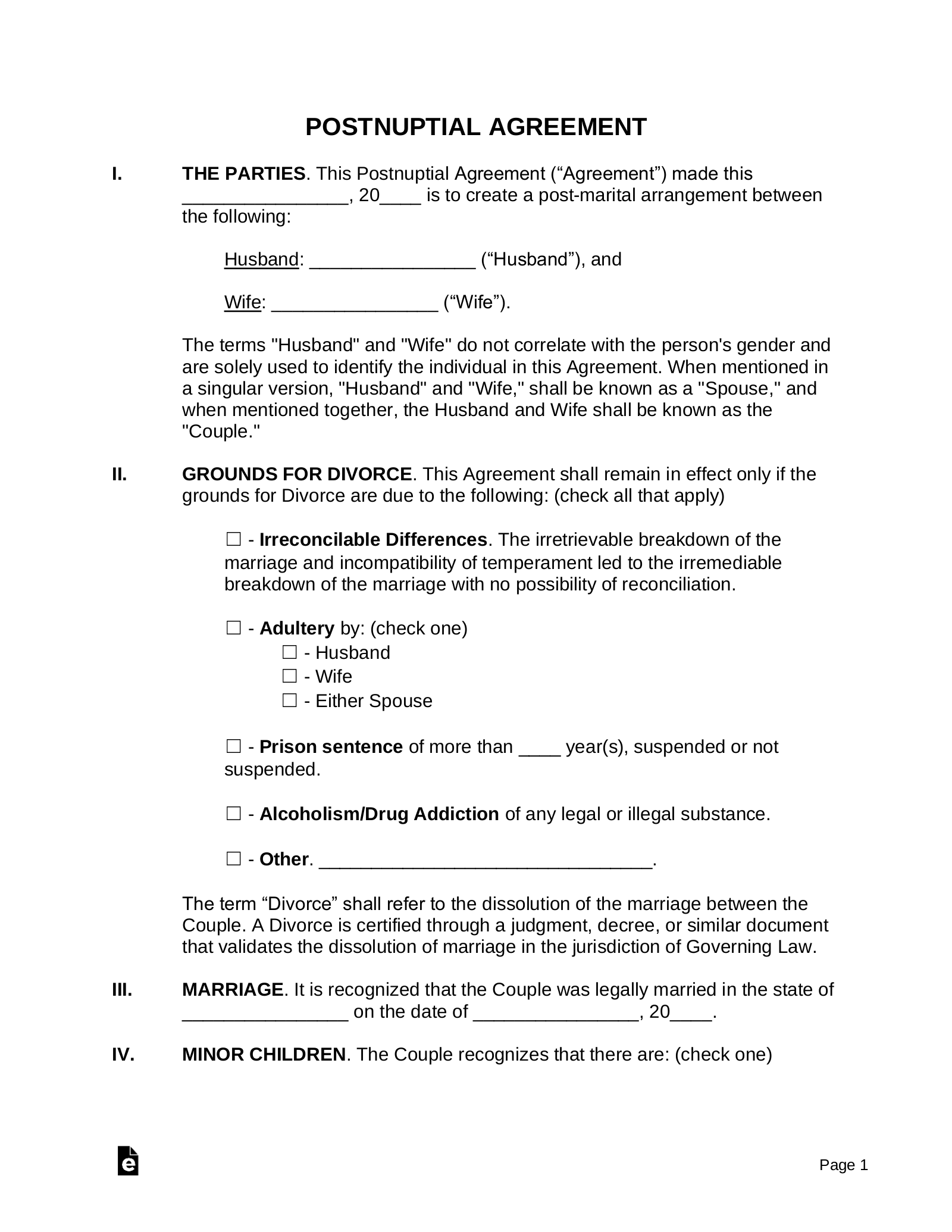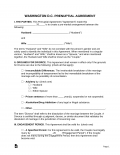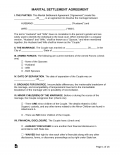Updated August 11, 2023
A postnuptial agreement, or “postnup” or “post-marital agreement,” is a legal document created between a couple after marriage that outlines the division of assets and spousal support in the event of divorce. The agreement can decide financial matters and cannot cover child support or custody.
When creating a postnup, there is no intention of filing for divorce. The agreement is only made as a safety precaution in case of such an event.
By State
- Alabama
- Alaska
- Arizona
- Arkansas
- California
- Colorado
- Connecticut
- Delaware
- Florida
- Georgia
- Hawaii
- Idaho
- Illinois
- Indiana
- Iowa
- Kansas
- Kentucky
- Louisiana
- Maine
- Maryland
- Massachusetts
- Michigan
- Minnesota
- Mississippi
- Missouri
- Montana
- Nebraska
- Nevada
- New Hampshire
- New Jersey
- New Mexico
- New York
- North Carolina
- North Dakota
- Ohio
- Oklahoma
- Oregon
- Pennsylvania
- Rhode Island
- South Carolina
- South Dakota
- Tennessee
- Texas
- Utah
- Vermont
- Virginia
- Washington
- Washington D.C.
- West Virginia
- Wisconsin
- Wyoming
Table of Contents |
What is a Postnuptial Agreement?
A postnuptial agreement is a legal document drafted after a marriage or civil union that allows the couple to make preparatory decisions about assets and affairs if there were to be a divorce, separation, or death of a spouse. The agreement must be signed by both spouses and may require a notary acknowledgment or witnesses (in accordance with state laws).
A postnuptial agreement only covers the financial distribution of property and assets after a divorce. All matters related to child custody are determined by the court.
Why Make a Postnup?
In some circumstances, postnuptial agreements are highly recommended for spouses that did not sign a prenup. Marital reasonings may vary, but a majority of cases may fall under one of the following:
- Inheritance – One spouse might receive a large inheritance or monetary windfall and may want to use the agreement as a protective effort.
- Financial recklessness – One party may have entered into periods of financial recklessness, causing monetary harm to the marriage and the other spouse.
- Expeditious marriage – Spouses may have married abruptly and missed the window to create a prenuptial agreement.
- Childcare – If one spouse leaves their job to stay at home and care for children, they may wish to ensure financial stability in case of divorce.
- Outdated prenuptial agreement – A former prenuptial agreement may contain obsolete information that no longer serves the couples’ needs.
Requirements to be Valid
Postnup agreements have to meet certain requirements in order to be accepted by a court of law. Failure to meet standards could cause a judge to void the agreement.
- Written – Oral agreements are not accepted as valid. The agreement must be written in accordance with state standards.
- Financial disclosures – Each spouse must disclose all assets, income, and liabilities in full (unless a waiver is signed). Failure of full disclosure or inaccuracy may invalidate the agreement.
- Voluntary – Each spouse must sign voluntarily.
- Conscionable – The agreement must be fair.
- Executed in accordance with state law – Signing requirements of the spouses’ state must be adhered to, which may include notarization and use of a witness.
Even after these requirements are met, a post-nuptial agreement may not be ironclad. State law may widely differ between what can and cannot be included in the document.
Do I Need a Lawyer?
A lawyer isn’t legally required for the execution of a postnuptial agreement, and spouses may create the agreement themselves without legal counsel. However, creating an agreement and subsequently commissioning a lawyer to review helps to ensure accuracy and enforceability. Use Findlaw’s family law lawyer search to find an attorney in a state to review a postnup.
Signing Requirements
| State | Signing Requirements | Statutes / Court Rulings |
| Alabama | Both spouses. | Barnhill v. Barnhill (1980) |
| Alaska | Both spouses. | Brooks v. Brooks (1987) |
| Arizona | Both spouses. | Ariz. R. Fam. Law. proc. 69 |
| Arkansas | Both spouses. | Stewart v. Combs (2006) |
| California | Both spouses must sign in the presence of an attorney or notary public. | In re Marriage of Friedman (2002) |
| Colorado | Both spouses. | Colo. Rev. Stat. § 14-2-306 |
| Connecticut | Both spouses. | Bedrick v. Bedrick (2011) |
| Delaware | Both spouses. | Hughes v. Peterson (2012) |
| Florida | Both spouses. | Casto v. Casto (1987) |
| Georgia | Both spouses. | Spurlin v. Spurlin (2011) |
| Hawaii | Both spouses. | Chen v. Hoeflinger (2012) |
| Idaho | Both spouses must sign in the presence of a notary public. | I.C. § 32-917 |
| Illinois | Both spouses. | In re Marriage of Richardson (1992) |
| Indiana | Both spouses. | Sanders v. Sanders (2018) |
| Iowa | Both spouses. | In re Marriage of Cooper (2009) |
| Kansas | Both spouses. | Davis v. Miller (2000) |
| Kentucky | Both spouses. | Luck v. Luck (1986) |
| Louisiana | Both spouses. | La. Civ. Code art. 2329 |
| Maine | – | No statute |
| Maryland | Both spouses. | Nouri v. Dadgar (2020) |
| Massachusetts | Both spouses. | Ansin v. Craven-Ansin (2010) |
| Michigan | Both spouses. | Skaates v. Kayser (2020) |
| Minnesota | Both spouses must sign in the presence of two (2) witnesses and a notary public. | Minn. Stat. Ann. § 519.11(2) |
| Mississippi | Both spouses. | Barton v. Barton (2001) |
| Missouri | Both spouses. | Lipic v. Lipic (2003) |
| Montana | Both spouses must sign in the presence of a notary public. | Mont. Code Ann. § 40-2-312 |
| Nebraska | Both spouses must sign in the presence of a notary public. | Devney v. Devney (2016) |
| Nevada | Both spouses. | Cook v. Cook (1996) |
| New Hampshire | Both spouses. | In re Estate of Wilber (N.H. 2013) |
| New Jersey | Both spouses. | Pacelli v. Pacelli (1999) |
| New Mexico | Both spouses must sign in the presence of a notary public. | N.M. Stat. Ann. § 40-2-4 |
| New York | Both spouses. | Hershkowitz v. Levy (2021) |
| North Carolina | Both spouses must be signed in the presence of a notary public or judicial officer. | N.C. Gen. Stat. Ann. § 52-10 |
| North Dakota | Both spouses. | N.D. Cent. Code Ann. § 14-03.2-05 |
| Ohio | Both spouses. | R.C. § 3103.06 |
| Oklahoma | Both spouses. | Boyer v. Boyer (1996) |
| Oregon | Both spouses. | In re Marriage of Grossman (2005) |
| Pennsylvania | Both spouses. | Lugg v. Lugg (2013) |
| Rhode Island | Must be “properly witnessed.” | Marscocci v. Marscocci (2006) |
| South Carolina | – | No statute |
| South Dakota | Both spouses. | S.D. Codified Laws § 53-8-2(2) |
| Tennessee | Both spouses. | Bratton v. Bratton (2004) |
| Texas | Both spouses. | Tex. Fam. Code Ann. § 4.104 |
| Utah | Both spouses. | Peirce v. Peirce (2000) |
| Vermont | – | No statute |
| Virginia | Both spouses. | Va. Code Ann. § 20-149 |
| Washington | Both spouses must sign in the presence of a witness and notary public. | Wash. Rev. Code Ann. § 26.16.120 |
| Washington D.C. | – | No statute |
| West Virginia | – | No statute |
| Wisconsin | Both spouses | Wis. Stat. Ann. § 766.58 |
| Wyoming | Both spouses | Long v. Long (2018) |
Related Forms (2)
Download: PDF, MS Word, OpenDocument
Download: PDF, MS Word, OpenDocument




